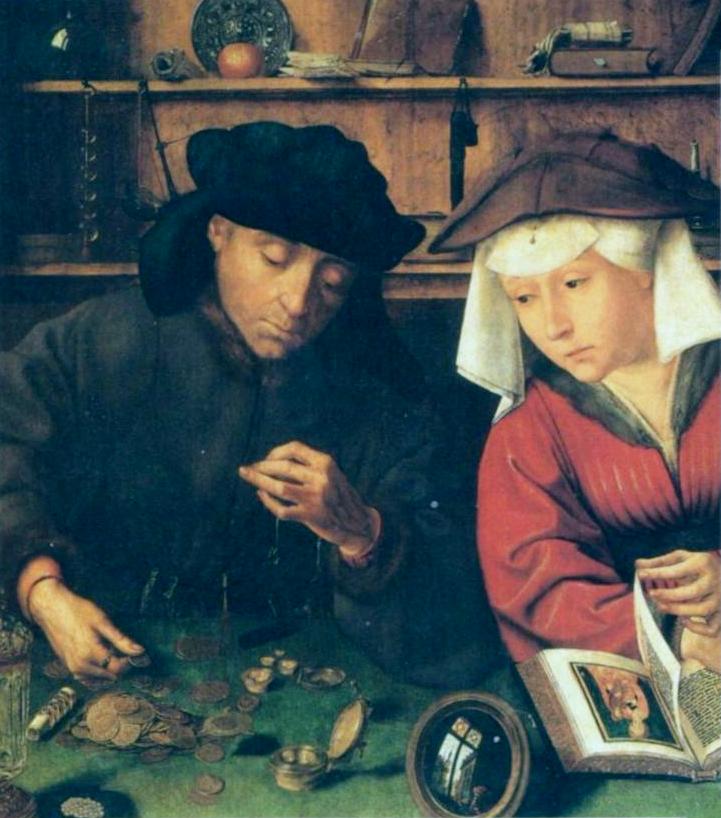
The Invention of Capitalism

Figure 1.--This Flemish masterwork, 'The money lender and his wife', by Quentin Metsys (1466-1530) was painted in Antwerp, the primary port for Flanders. It was painted in 1514 as the conditions leading to the invention of capitlism were beginning to come together in northern Europe, but just before the Reformation. It beauutifully illustrates medieval ideas that were disolving, but still existed even in northern Europe. The husband is shown transfixed by his wealth, gold and jewels, which he acquired by lending money--something the Catholic Church disproved. His angelic wife depictd in more ideaized form is uneasy with her husband's focus on wealth. Notice her devotional book with the portrit of the Madona. (Probably not a Bible which the Catholic Church did not encourage people to read.)
|
|
Capitalism like democracy is the unique creation of the West. The two were intricately linked and appeared at the same place and comparable times--the Netherlands and England (17th century). Conditions favorable to the rise of capitalism occurred through large areas of Western Europe. This began with several developments. First was the quickening of economy in the late medieval era. In part because of the Crusades and the Renaissance we begin to see banks developing in the Italian city states. Second was the demographic crisis of the 14th century resulting from the devestaing plague. This substantially reduced the European populations and increased the bargaining strength of the peasantry in their relationship with fedudal lords. The result was to sinificantly weaken the manorail system. The result was to expand free labor, innovation, and productivity. Third was the maritime expansion of the West as a result of technological advances, both to the East and the discovery of the Americas in the West. Trade with the East expanded trade. The conquest of the America resulted un huge quantities of bullion (gold and silver) flooding into Europe as well as new products. The potato was particularly important becaus it significantly increased agricultural productivity, especially in northern Europe. Maritime trade with the East also shifted trade routes and commerce away from the Mediterranean, but also undemined the primarily trading economies of the Arabs and Ottomans. These devlopments might suggest that capitalism would be invented in southern Europe. There were the merchant banks of Italy and the vast wealth acruing to Portugal and Spain by the maritime outburst and conquest of the Americas. But this did not occurr, it was in northern Europe that capitalism was invented. The economonic hot spot of Europe began to shift to the north. The Low Countries dveloped an exptemely profitable wool weaving industy in Flanders. England was tied to this development as the source of the wool. Thus it was not the bullion rich countries, but the more productive countries and provinces to the north. Spain and Portugal squandered much of their weath on buying the products from the productive north rather than devloping their own industries. And at the same time the Iquisition discouraged innovation and free thought, in effect locking the medieval mind into the Catholic monarchies The rich Low Countries became a province of Spain. At about the same time the Protestant Reformation swept through northern Europe. This both separated part of the Low Countries from Spain and changed the outlook of the people of northern Europe, including ideas favorable to capitalism. Traders first in Amsterdam and and then in London created the first chartered joint-stock companies which helped to promote commerce and trade. The first stock exchanges were established. Important banking and insurance institutions were founded. The Netherlands under assault from the Spanish was not a large enough country to drive the creation of capitalism. England although aelatively small country at the time was. At the same time the Glorious Revolution took place in England, once and for all establishing the auhority of a Protestant elected parliament over a Catholic absolutist monarchy. And in this process Protesrant troops from the Netherlands played a key role. While it is understanable why capitalism was invented in northern Europe. It is less clear why it was not invented in India or China, both of which were richer than Europe at the time of the Reformation.
CIH

Navigate the Chiildre in History Web Site:
[Return to the Main capitalism page ]
[Return to the Main modern industrial era economics page]
[Return to the Main Economics page ]
[Introduction]
[Biographies]
[Chronology]
[Climatology]
[Clothing]
[Disease and Health]
[Economics]
[Geography]
[History]
[Human Nature]
[Law]
[Nationalism]
[Presidents]
[Religion]
[Royalty]
[Science]
[Social Class]
[Bibliographies]
[Contributions]
[FAQs]
[Glossaries]
[Images]
[Links]
[Registration]
[Tools]
[Children in History Home]
Created: 2:03 AM 3/4/2017
Last updated: 2:03 AM 3/4/2017



